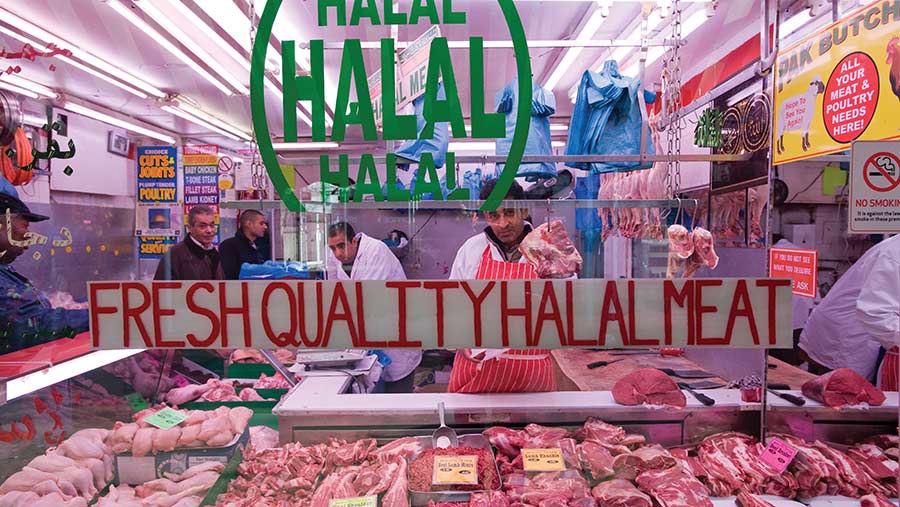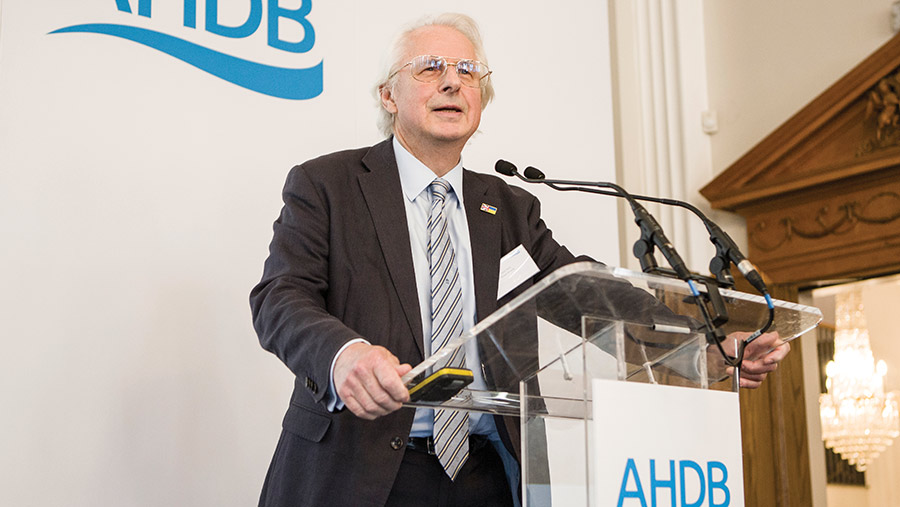Halal lamb: ‘A market farmers can no longer ignore’
 © Gregory Wrona/Alamy Stock Photo
© Gregory Wrona/Alamy Stock Photo The consumption of halal meat may have its detractors, but Awal Fuseini, senior sector manager at the AHDB, says it is a market that farmers and processors can no longer ignore.
Currently, 72% of the sheep slaughtered in England and Wales are killed according to halal processes (as well as 56% of the nation’s goats, 5% of its calves and 4% of its cattle).
And, even though Muslims represent just 6.5% of the population, they manage to chomp their way through 20% of the lamb that comes onto the UK market.
See also: Better labelling needed as kosher meat reaches non-kosher markets
And that market is set to grow, given the fast-expanding Muslim population.
Data from the Office of National Statistics show that, from 2011 to 2021, the number of Muslims in the UK increased by 1.16 million out of total population growth of just 3.5 million.
Currently, there are almost 4 million Muslims in the UK, and that is expected to reach 5.5 million by 2030.
High incomes
As well as high birth rates, the UK’s Muslim population has a growing middle class with relatively high disposable incomes. And as Muslims become richer, so they spend more on meat.
AHDB research found that 62% of the Muslim population consume lamb at least once a week, compared to only 6% of the general population.
And further analysis shows that Muslims in the UK spend an average £28/household a week on all meat, compared with £13/household for the population as a whole.
Overall, it is estimated that the halal meat market in the UK is worth about £2bn.

Awal Fuseini © AHDB
The high number of religious festivals in the Muslim community, such as Ramadan in March and Eid Fitr in April, is another driver.
For example, the Qurbani festival in June encourages every solvent Muslim to pay for an animal to be processed on their behalf, and the meat is then divided into three for distribution to charity and the needy.
Carcass balance
Another important aspect of the halal market is carcass balance.
“Any halal butcher will have plenty of cows’ feet, sheep heads, and tripe – products you cannot find in Tesco, Asda or Morrisons,” says Dr Fuseini.
“Most consumers in the UK don’t eat these things, but please don’t look at them as low-quality, low-value products.”
The same applies to mutton, with more than 90% of the mutton farmers produce in the UK ending up in the halal market. “Go to Tesco, Asda or Morrisons and you’ll struggle to find any. Go to a halal supermarket, and it’s full of mutton.”
Dr Fuseini also sees considerable opportunities in the export market, especially for those cuts and offal that are less popular in the domestic market.
“The Muslim population is growing everywhere in the world,” he says. “One in four people worldwide are now Muslim, and there are some countries which are almost 100% Muslim.”
Muslim-dominated markets in the Middle East and Far East are among the destinations where the AHDB and the Department for Business and Trade are focusing their export promotion efforts. According to Dr Fuseini, this is money well spent.
The Demonstration of Life protocol
Launched in 2021, the Demonstration of Life protocol for sheep is the culmination of several years’ work by organisations, including the NFU, AHDB, the University of Bristol, the British Veterinary Association and various halal certification bodies, led by cross-bench peer Lord Trees.

Lord Trees © AHDB
“The key issue for halal is that the animal is alive at the time it is killed by the knife cut,” Lord Trees explains.
“So if you can demonstrate that the animal has received a non-lethal stun – a recoverable stun – then that animal can be classed as halal.”
The protocol is similar to the system used in New Zealand, where all lamb is now processed in this way and classed as halal – key to securing access to major markets in the Middle East and Far East.
Under the Demonstration of Life protocol, each abattoir has to demonstrate to the halal certifying body, using a maximum of two sheep (or goats) a year, that the electrical head stun does not kill the animal, but that it can partially recover.
It does not recover full consciousness, but is technically alive at the point of slaughter and therefore acceptable for most halal certifying bodies.
The demonstration process is overseen by the FSA, animal welfare officers, and observers from the halal authorities.
Pending their approval, the whole plant may then be allowed to stun and slaughter thousands of sheep for the halal market.
“So far, the protocol is for sheep and goats only,” says Lord Trees. “We get asked a lot about other species – cattle and chicken – but there are technical problems with both.
“But for sheep, it is official, it is available, it is relatively cheap and it provides great assurance to the Muslim and non-Muslim communities alike, though we would like to see greater uptake.”
Since its launch in 2021, it is understood that just a handful of abattoirs have taken up the protocol, though there is plenty of pre-stunned sheepmeat from other abattoirs outside the scheme.
Your questions answered
What is halal slaughter?
Traditionally, halal slaughter involves killing an animal without prior stunning – something that is allowed under UK law in licensed slaughterhouses for certain religious groups.
There are several halal certifying bodies, some of which do accept prior stunning (so long as it is not fatal), and some which do not.
Which of these two methods predominates?
A major survey of abattoirs in England and Wales by the Food Standards Agency in 2022 showed that, of the 72% of all sheep slaughtered using halal methods, roughly two-thirds were stunned prior to slaughter, while one-third received no stun at all.
That “non-stunned” sheepmeat actually accounts for about 22% of all the sheep slaughtered in England and Wales, compared with 10% back in 2011.
How many slaughterhouses are involved?
According to the 2022 survey, 38 abattoirs in England and Wales are certified to kill sheep using halal “stun” slaughter (mostly approved by the Halal Food Authority), while 24 abattoirs kill sheep without stunning (mostly approved by the Halal Monitoring Committee).
What if, as a sheep farmer, I don’t want my animals killed without stunning?
To be sure your animals are stunned before slaughter, then you must sell direct to an abattoir that always stuns before slaughter. If you sell via a live auction mart, it is not possible to be sure whether they will be killed with or without stunning.
If 22% of lamb in the UK is “non-stunned”, how, as a consumer, can I avoid it?
At retail level, any sheepmeat carrying a Red Tractor or Quality Meat Scotland logo will have involved stunning – though it is not possible to tell from the label if it has been “conventionally stunned”, or “halal stunned” (though the actual technique of stunning is the same in each case).
Generally, the major supermarkets only sell pre-stunned lamb, though in some areas with high Muslim populations, there may be a specialist halal counter in store with “non-stunned” meat.
At food service level, consumers can ask about the provenance of the meat, but it will be hard to be sure.
Can I get a premium from the halal market?
Yes. One way is to time the sale of your lamb to coincide with the big religious festivals, when demand is strong and prices typically higher.
The other way is to sell direct to the consumer. Many Muslims are very interested in the provenance of their meat and want to know how it has been produced. They will pay a premium for this reassurance.
Sources: AHDB, Food Standards Agency, Humane Slaughter Association
